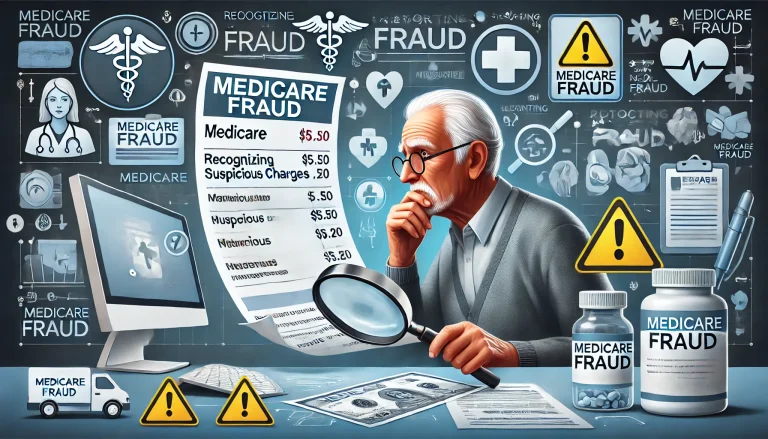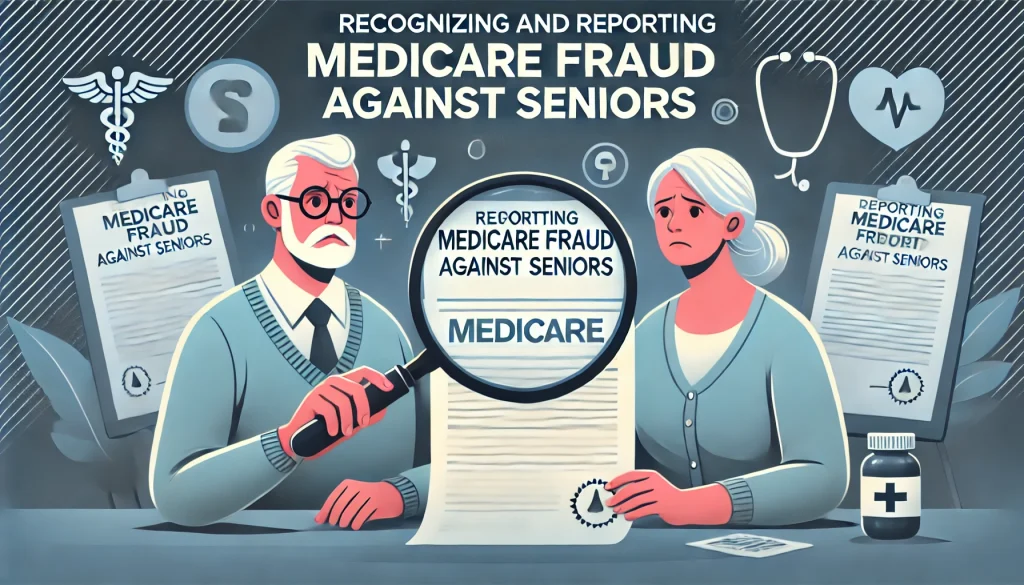Medicare fraud is a serious issue that affects millions of seniors across the United States. Fraudsters exploit the complexities of the Medicare system to deceive and steal from elderly individuals, resulting in billions of dollars in fraudulent claims each year.
“Senior Medicare Patrol places estimates at $60 billion a year—far lower, but still significant. The amount of money lost to fraud is not surprising, considering the total spending on Medicare and Medicaid exceeded $1.6 trillion in 2021 and continues to grow.” – Forbes.com
Understanding how to recognize and report Medicare fraud is crucial in protecting yourself or your loved ones from becoming victims.

What Is Medicare Fraud?
Medicare fraud occurs when someone intentionally deceives Medicare to receive unauthorized benefits or payments. This can include falsifying information on medical claims, billing for services not provided, or using someone else’s Medicare information to gain benefits.
Examples of Medicare Fraud
- Phantom Billing: Providers bill Medicare for services or supplies that were never provided. For example, a healthcare provider might submit claims for treatments or tests that the patient never received. A recent article on newsweek.com highlighted the alarming number of Phantom Billing occurrences against seniors.
- Upcoding: A medical provider bills for a more expensive service than what was actually provided. For instance, a doctor might perform a routine check-up but bill Medicare for a comprehensive physical examination.
- Unnecessary Services: Providers perform and bill for services or tests that aren’t medically necessary. For example, a medical professional might order a series of expensive tests for a patient who only needs a basic evaluation.
- Kickbacks: Healthcare providers receive payments or other incentives in exchange for referring patients for specific services or to particular providers, which can lead to unnecessary or overpriced treatments.
Identity Theft: Fraudsters use someone else’s Medicare information to obtain medical services, equipment, or prescriptions. This not only results in fraudulent charges but can also negatively impact the victim’s medical records and future treatment.
Recognizing Medicare Fraud
Recognizing Medicare fraud can be challenging, but there are warning signs that you can look out for:
- Unexpected Bills: Receiving bills or statements for services you didn’t receive is a red flag. Always review your Medicare Summary Notices (MSNs) and Explanation of Benefits (EOBs) carefully.
- High-Pressure Tactics: Be cautious of providers who pressure you into unnecessary tests or treatments, especially if they seem unrelated to your medical condition.
- Free Services Offers: Be skeptical of unsolicited offers for free medical equipment or services, especially if you are asked to provide your Medicare number.
- Inconsistent Medical Records: If your medical records contain treatments or services you did not receive, this could indicate fraud.
Reporting Medicare Fraud
If you suspect Medicare fraud, it’s important to report it immediately. Here’s how:
- Contact Medicare: Call 1-800-MEDICARE (1-800-633-4227) to report suspicious activity. Be prepared to provide your Medicare number, the provider’s name, the service or equipment in question, and the date of the service.
- Office of Inspector General (OIG): You can also report fraud to the Department of Health and Human Services OIG by calling 1-800-HHS-TIPS (1-800-447-8477) or visiting their website at oig.hhs.gov.
- State Health Insurance Assistance Program (SHIP): SHIP counselors can help you understand your Medicare benefits and assist with reporting fraud. Find your local SHIP contact at shiptacenter.org.
- Local Law Enforcement: If you believe you are a victim of identity theft, report it to your local police department and the Federal Trade Commission (FTC) at identitytheft.gov.
- Contact Rondesse: If you’re unsure of how to proceed or uncertain about who to contact, Rondesse’s SOS feature is available for you to use. You will be assisted immediately by fraud and scam specialists who can assess your situation and help you with the next steps.
Tips for Preventing Medicare Fraud
- Protect Your Medicare Number: Treat your Medicare number like a credit card number. Don’t share it with anyone who contacts you through unsolicited phone calls, e-mails, etc.
- Review Statements: Regularly check your MSNs and EOBs for accuracy. Report any suspicious charges or unfamiliar providers.
- Stay Informed: Educate yourself about common fraud schemes and stay updated on new scams targeting Medicare beneficiaries. Regularly visit our blog for information on new fraud or scam trends that you and your family should be aware of.
- Be Skeptical: Be wary of any offer that sounds too good to be true or anyone who pressures you into making quick decisions regarding your healthcare.
Conclusion
Medicare fraud against seniors is a pervasive problem that requires vigilance and prompt action to combat. By recognizing the signs of fraud and knowing how to report it, you can protect yourself and help prevent others from becoming victims.
At Rondesse, we understand the critical need for comprehensive protection against scams and fraud. Our services include an SOS feature, allowing you to immediately connect with fraud and scam specialists who can provide expert assistance. The Scam SOS button is on the top right corner of our website, and you can access it 24/7 if you need assistance from our specialists.
Don’t wait for fraud to strike—explore Rondesse as your trusted partner in safeguarding yourself and your family against scams and fraud. With our proven and advanced monitoring, detection, and prevention strategies, you can be confident in your digital and financial safety. Contact Rondesse today to learn more about how we can help protect you and your loved ones from Medicare fraud and other scams.





